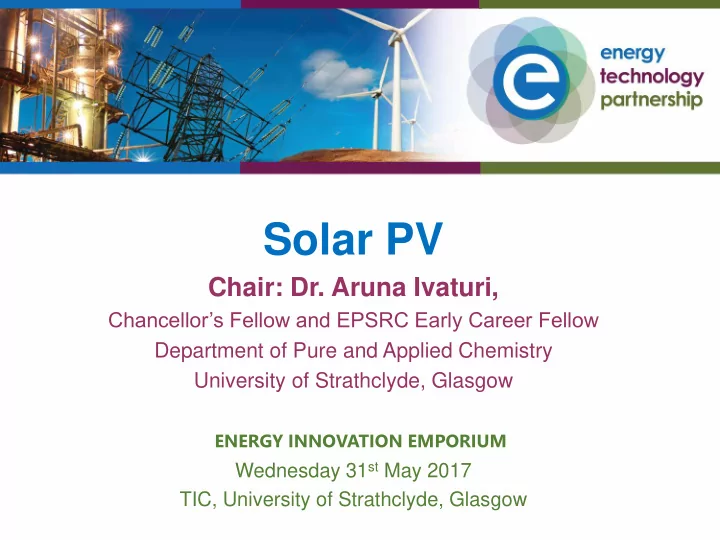

Solar PV Chair: Dr. Aruna Ivaturi, Chancellor’s Fellow and EPSRC Early Career Fellow Department of Pure and Applied Chemistry University of Strathclyde, Glasgow ENERGY INNOVATION EMPORIUM Wednesday 31 st May 2017 TIC, University of Strathclyde, Glasgow
Panel Members John Forster Ewan Sneddon Chairman STA Scotland & Senior Solar PV Design Engineer Chairman Roofing Industrial Energy Forster Group Ltd. Forster Group Ltd. [ewan.sneddon@forsterenergy.co.uk] [john.forster@forstergroup.co.uk] Industrial Sector Public Academia Sector Aruna Ivaturi Chris Thomson Chancellor’s Fellow & Head of Assets EPSRC Early Career Fellow Castle Rock Edinvar University of Strathclyde [Chris.Thomson@castlerockedinvar.co.uk] [aruna.ivaturi@strath.ac.uk]
Scottish Energy Strategy A New 2030 ‘All Energy’ Renewables Target To delivery the equivalent of 50% of Scotland’s heat, transport and electricity consumption from renewable sources
Scottish Energy Strategy Electricity Generation by Fuel Type Renewables Nuclear Coal Gas • In 2015, 59.4% of Scotland’s electricity consumption was met by renewables
Scottish Energy Strategy Electricity Generated from renewable sources, Scotland, 2000-2015 Other Bioenergy Wind Hydro Other – Solar??
Solar in Scotland UK and Scotland receives as much solar irradiation as Germany which has one of the largest PV market
Scottish Energy Strategy Solar PV is considered one of the main technologies that generate renewables electricity
Role of Solar PV - Industry perspective John Forster Chairman STA Scotland & Chairman Roofing Industrial Energy Forster Group Ltd. Ewan Sneddon Senior Solar PV Design Engineer Forster Group Ltd.
Supporting an industry
2030 Solar PV Deployment 7.00 6.00 5.00 4.00 GW 3.00 2.00 1.00 0.00 Scenario 1: Business as usual Scenario 2: Reduced barriers Scenario 1: Business as usual Scenario 2: Reduced barriers Ground Mount 0.35 1.38 Commercial 0.34 3.00 Domestic 0.82 2.23
Supporting an industry
Solar thermal 2030 targets 180 160 140 120 100 MW 80 60 40 20 0 Scenario 1: Business as usual Scenario 2: Reduced barriers Scenario 1: Business as usual Scenario 2: Reduced barriers Installed Capacity 2030 (MW) 17.0352 170.352
The barriers
STA Scotland Asks knowledge planning transfer permitted development conservation areas EESSH building standards public estate MIP grid constraints business rates energy storage wind & storage VAT co-locating solar
Business rates “In England the Rateable Value is currently set by applying a maximum rate of £8.00 per kWp to an install, therefore a 150kWp install would pay £576 p.a. in business rates. In Scotland the Rateable Value can be anywhere between £200 and £700 per panel, so that same 150kWp install would pay up to £10,080 p.a. in business rates. Both ratings methodologies are under review in the 2017 re- evaluation.”
The opportunities
Role of Solar PV - Public Sector Perspective Chris Thomson Head of Assets Castle Rock Edinvar
Challenges for Public Sector - Housing Addressing Fuel Poverty Creating Low Carbon Solutions Return on Investment Upskilling Workforce Developing Knowledge
Current Solar Use (% of stock) • Solar PV (16.5%) • Solar Thermal (2.2%) • Sunamp Heat Store (6.5%)
Energy and Solar Initiatives • Our Power founding member, • FIT maximisation on commercial and sheltered units, • Lease Option of roof space, • Solar Thermal, • Sunamp, • LECF - other awards
Main Solar Considerations For Our Sector • Procurement • Consents • Financial Driver • Impact - Housing Management, Visual, Customer, Value • Locations • Knowledge of Assets
Role of Solar PV - Academia Perspective Aruna Ivaturi Chancellor’s Fellow & EPSRC Early Career Fellow University of Strathclyde
Innovations in the Field Incremental Innovations : Continuous drop in the PV cost Deutsche Bank Report
Innovations in the Field Potential Step-Change Innovations : Emerging PV technologies
Innovations in the Field Potential Step-Change Innovations : Perovskite Solar Cells
Innovations in the Field Perovskite Solar Cells: 23.6% Efficient Perovskite/Si Tandem Perovskite/Si Tandem solar cells Perovskite solar cells Nature Energy 2 , Article number: 17009 (2017)
Thank you for you attention!
Recommend
More recommend